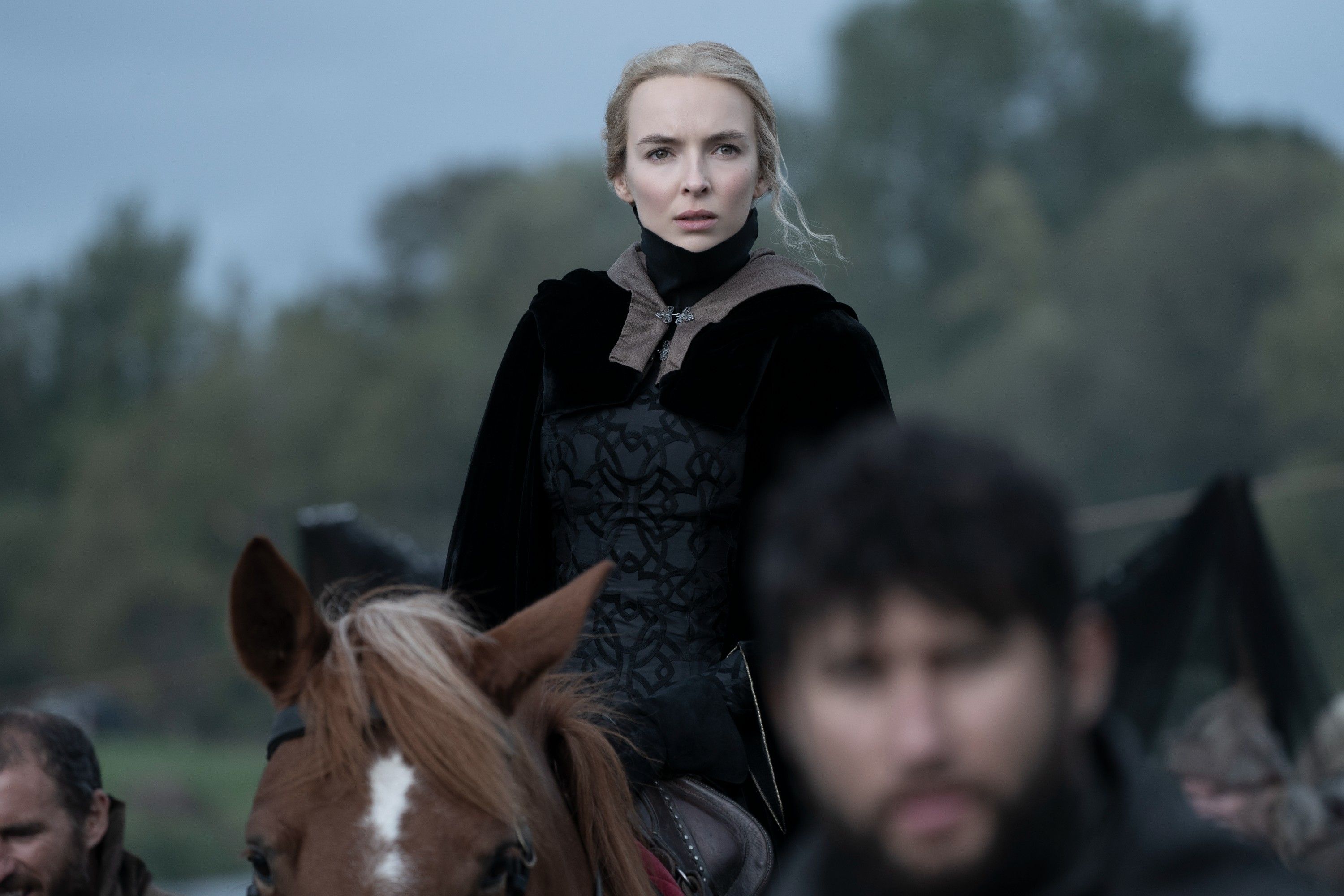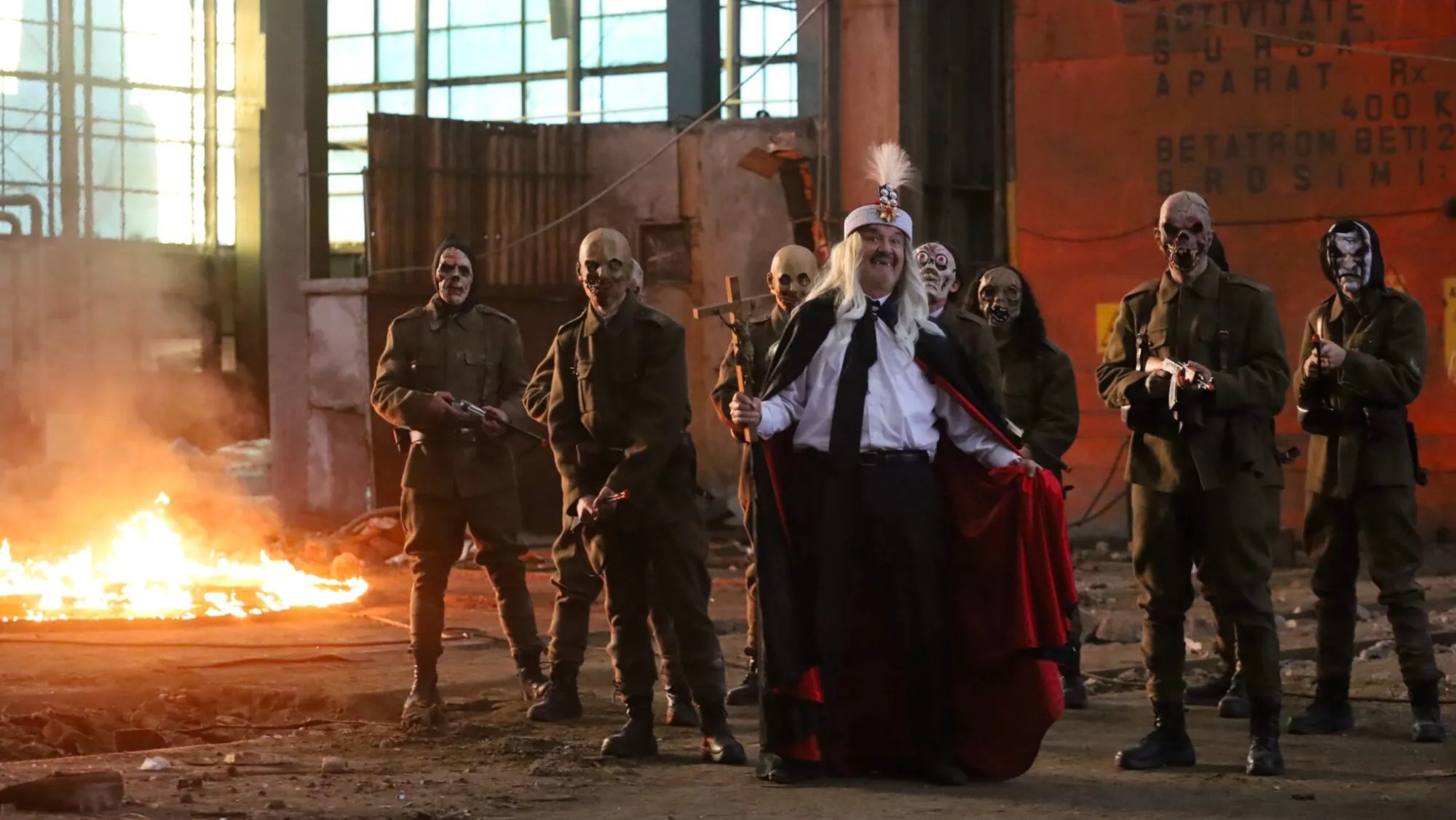![]()
In its visual grandeur and operatic style, The Last Duel, Ridley Scott’s highly anticipated medieval epic that Scott has attempted to recapture the glory of his Oscar winning Best Picture winner many times with ambitious and failed projects like Kingdom of Heaven, Robin Hood, and Exodus: Gods and Kings reassures his status as one of Hollywood’s most visionary big-budget filmmakers working in Hollywood today. This grandiose Shakespearian tragedy about assault, coercion, loyalty, and betrayal and the quest for revenge and redemption interweaves the stories of three characters all told in three separate chapters with different perspectives as they embark on a journey towards closure and truth during the year of 1386 in medieval France. With a magnificent cast led by Matt Damon, Adam Driver, Ben Affleck, and Jodie Comer all deliver potent performances as characters enduring a web of treachery and calamity. With a running time of just a little over two and half hours while being released in October on the same weekend as Halloween Kills will not bring in the success of Gladiator box-office numbers.
An iconic director of our time that certainly has a hit-or-miss track record of many films that have a wide range of genres and styles throughout Scott’s career, The Last Duel also holds some hit-or-miss moments, but it’s very accomplished and Scott in his most confident in decades. In his latest film, (Scott also has the upcoming House of Gucci being released next month), just as his previous epic films, he proves to be a skilled craftsman who makes bold choices and attaches himself to scripts that have themes about revenge and power, betrayal and maintaining one’s honor. A dramatically engaging storyteller, elegant visual stylist with a track record of often pulling exceptional performances out of his actors–here the true standout performance is Jodie Comer who delivers an emotionally layered performance that is both commanding and fearless. Her performance here certainly deserves some Best Supporting Actress Oscar attention depending if 20th Century decides to go there.
What Scott has struggled with many of his inferior films, however, is his pedestrian spirit with a straightforwardness that often feels overly simplistic. While technically impressive, Gladiator, Kingdom of Heaven, and Robin Hood all suffered with some of the writing in these aspects, and felt at odds with his caustic visual approaches with many films that suffer from exhausting running time, uneven pacing, and lack of complexity. The Last Duel on the other hand is a superb adapted screenplay that is based on the 2004 Eric Jager book The Last Duel: A True Story of Trial by Combat in Medieval France which chronicles in historical account about the very last judicial session permitted by the Parliament of France in the late 14th century. Adapted and co-scribed by the fellow Oscar-winning duo and fellow Producers, co-stars Matt Damon and Ben Affleck (Good will Hunting) and co-written and Produced by Oscar nominated writer (also director) Nicole Holofcener (A Beautiful Day in the Neighborhood, Can You Ever Forgive Me?) have elevated Scott’s vision and sensibilities into an emotionally engaging–and superbly acted saga.
The saga opens the film up with two armored knights as they duel and charge towards each other as they square off for a fatality. In pedestrian fashion, the film cuts away from a crowd cheering and away from the duel through flashbacks that reveal the events that generated the challenge between the two men. It’s also a more rare duel that actually determines the verdict of a trial. The duel involves, one knight, Jean de Carrouges (Damon), whose gorgeous wife, Marguerite (Comer), accuses the other knight, and an old close friend and fellow solider Jacques Le Gris (Adam Driver), of raping her one night as Jean was across country collecting debts that was owed to him. The stipulation of the duel and the rules of the court at the time—in which a hearing involving lawyers and court officials debate and persuade what the verdict should be–if Jacques defeats Jean, that would prove he is innocent and prove that Marguerite’s bears false witness and the verdict will be that she is burnt alive.
Highly influenced by Akira Kurosawa’s 1950 masterpiece Rashomon in terms of structure and how the story holds varying, individual perspectives that we have seen borrowed, utilized, and even parodied before–the film’s structure repudiates itself just like how any court hearing is with different testimonies. The performances here by , Damon, Driver, and Comer, all deliver enthralling performances that are sustained with a lot of emotional levels that could have easily dissolved into histrionics. Driver is charming, at times theatrical, and other times nuanced here, as he sells his charm while also holding a very dark nature. Affleck is certainly having a riot here as he channels in Klaus Kinski with the look of a younger Max von Sydow look from an Ingmar Bergman film.
Told in three chapters, the two chapters are the men’s stories and the stories are structured similar as both men attempt to find prosperity during a chaotic time period of French history that included a wars and a plague and people’s livelihood are at the mercy of an arrogant property owner, Pierre d’Alencon (Affleck). Playing with characterizations within the characters’ perceptions, it’s done subtly that never draws too much attention to itself as being a gimmicky device. For instance in Jacque’s version, Jean is brave and principled soldier who is also a philistine that doesn’t deserve the intellectual Marguerite, in which, Jacques is very drawn to with her inclination of great literature, and he can sense an attraction after he gives her a congratulations kiss to the mouth upon Jean and Marguerite’s marriage. Which leads Jacques and Marguerite to have a few flirtatious exchanges that leads to a bedroom encounter in a bedroom in which Marguerite resists his approaches, Jacques is convinced that she didn’t really mean since he’s convinced their attraction and connection is there. In this perspective Jacques’ charm to other women comes off more playful and consensual, and both Jean and Jacques feel stoic in their battle scenes.
The third and most compelling story involves Marguerite’s that is titled “The Truth According Marguerite” as the rest of the text dissolves onscreen as just the word “truth” stays on and renders the most emotional layers and vulnerabilities. You can certainly see Holofcener’s sensibilities at hand in this particular narrative as it feels very genuine and even at odds with the other moments in the film. As she should since she has experience with female-driven narratives with such solid works that she has also directed with such films as Walking and Talking, Lovely and Amazing, Please Give, and Enough Said. Interestingly enough, war and combat feels more despairing and insufferable, Jean feels a lot more controlling, and Jacques womanizing in Pierre’s court feels a lot more predatory. Of course perspective of the sexual assault is equally disturbing, but feels even more distressing and resistant.











Have been a Ridley Scott fan for yeaslrs, I will be seeing it.
Love this site, nd saw some new movies..have to check those movies
Decent, predictable historical epic if you can overlook logic, holes in plot and storytelling and a how much of a terrible actor Ben Affleck is!
2.5/5
Great review of a what looks to e a great movie. Rewatched Gladiator a few months back.
I might be up for this. The Counselor was uneven but some of that strong and Scott at his most off beat. Not long ago I also caught his very first film, late 70’s The Duelist and that was taut and intimate Barry Lyndon in miniature, good show.
For whatever my opinion is worth, the “Unrated Extended Cut'” of The Counselor (not the theatrically-released cut) is great. Scott’s movies for me vary wildly depending on the written material he’s working with, and with The Counselor he has a screenplay by one of the great living authors, Cormac McCarthy, and the long version of the movie is as brutal and stark and horribly strangely beautiful in its way as McCarthy’s novels. Definitely not for everybody though, and if the theatrical version was too brutal for one’s taste, then chances are one probably wouldn’t like the long version any better.
I do adore Jodie Comer (if you haven’t seen her in the series “Killing Eve” with Sandra Oh, you’re missing her as one of THE best psychopaths I’ve ever seen–she won the Emmy for it), so I am looking forward to this film, just to see her!
Surprised how Hollywood is not promoting as well or independent films are not being promoted is more understandable with self funds. But this review is very articulate I’m going to watch this tonight especially since Hollywood at the moment is dead and most of the films are bad acting and story’s this one seems very interesting and original
Brilliant film! Jodie Comer was phenomenal and Ben Afflek played a great “Villain” in Pierre! Damon and Driver were Brilliant as always. Oscar worthy for sure!
I don’t think I will check out The Last Duel because any movie with post 2010 Matt Damon is already a disappointment especially if he has a weird beard and MUBI bought streaming rights for Titane who will premiere it as an exclusive in Feb 2022.
Just an amazing masterpiece from an amazing master. Once again I was glued to my seat as I was there to bare witnesses to the pain the love and the justice. I felt as if my heart stopped for Marguerites pain over and over.
It almost put me to sleep. If you’re going to tell varying perspectives than they should vary a lot more than this film does. I do agree with Robert that Jodie Comer was fantastic.
A lot of people I have talked to didn’t like this film. I really enjoyed it. Watching all 3 dramatic perspectives, followed by a high level, raw action sequence, was highly stimulating for me.
I appreciate how this blog promotes self-growth and personal development It’s important to continuously strive to become the best version of ourselves